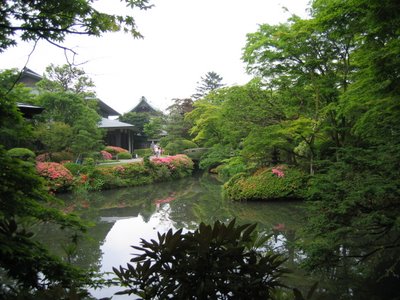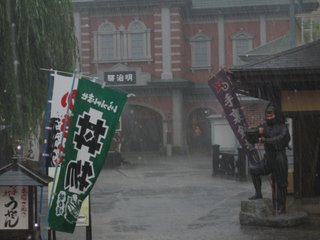Tokyo's shops stock almost every product, but there are a few items I have found difficult to locate. Here are some examples:
1.
Decaffeinated coffee. I like the taste of coffee, and coffee does have newly appreciated health benefits, but the caffeine increasingly bothers me. So I brought a one pound bag of chemical-free Swiss Water Process decaf from Chicago. There are two places I've found that serve a cup of decaf, probably the chemical kind. At the IBM coffee counter you can ask for "mild koh-hee" and you'll get decaf. It's 110 yen for a small cup, so it's a (subsidized?) bargain. Starbucks also serves decaf, although you have to wait several minutes because it's brewed in a decanter, on the spot, since it's an unusual request. There it's about 270 yen for what in the U.S. would be called "short" (a "secret" size in the U.S. that Starbucks sells but doesn't list), the same price as regular coffee. Presumably one could order decaf vanilla latte espresso hazelnut Sumatra mocha (or whatever) and, after considerable confusion, you might get it. I've never tried, primarily because I cannot fathom wrecking the taste of coffee with 16 other ingredients.
2.
Unsalted peanuts. Haven't found them. Often the peanuts have MSG. Similar problem locating natural peanut butter.
3.
Dried natto. A Japanese product that's hard to find in Japan! Refrigerated dried natto, yes, and it's pricey. Japan Airlines serves dried natto (snack) in business class, and they sell mail order dried natto for about 6000 yen (!) per box. I haven't found JAL-style dried natto in any of the shops yet. I really like dried natto snack, and supposedly it's an amazing health food. It has a wonderful yeasty flavor. There's a
U.S. company that started to import dried natto snack, but unfortunately they have suspended orders at present while reorganizing.
4.
English-style cider. I found "apple beer" in a restaurant once, but it was simply beer with some apple flavoring. Not even the giant Carrefour in Makuhari stocked hard cider. There's a bar ("pub") close to my apartment that lists a bottle of cider for 900 yen, but they were out during my one disappointing visit.
5.
Dark beer. Guiness Stout (which I don't like) is reasonably popular, but a good, dark beer is a little hard to find. One of the Japanese beer companies makes a dark beer — I think it's called "Asahai Dark" — and it's quite good but oddly hard to find. (Asahai is a giant Japanese beer company.) One Japanese restaurant I visited served a 1400 yen boutique Japanese dark beer in a fancy brown bottle, and that was also good but obviously expensive. Carrefour stocked Newcastle, and I think Don Quijote does as well, at about 300 yen per bottle. The average Japanese sushi, yakitori, or other establishment only stocks pale beers.
6.
Whole grain bread. Paul, the French-style bakery, has it priced at 400 yen for a small loaf. However, the last two trips they've been out of stock.
Of course there are many Asian products that are difficult to find in the U.S., and I like a lot of those products.

